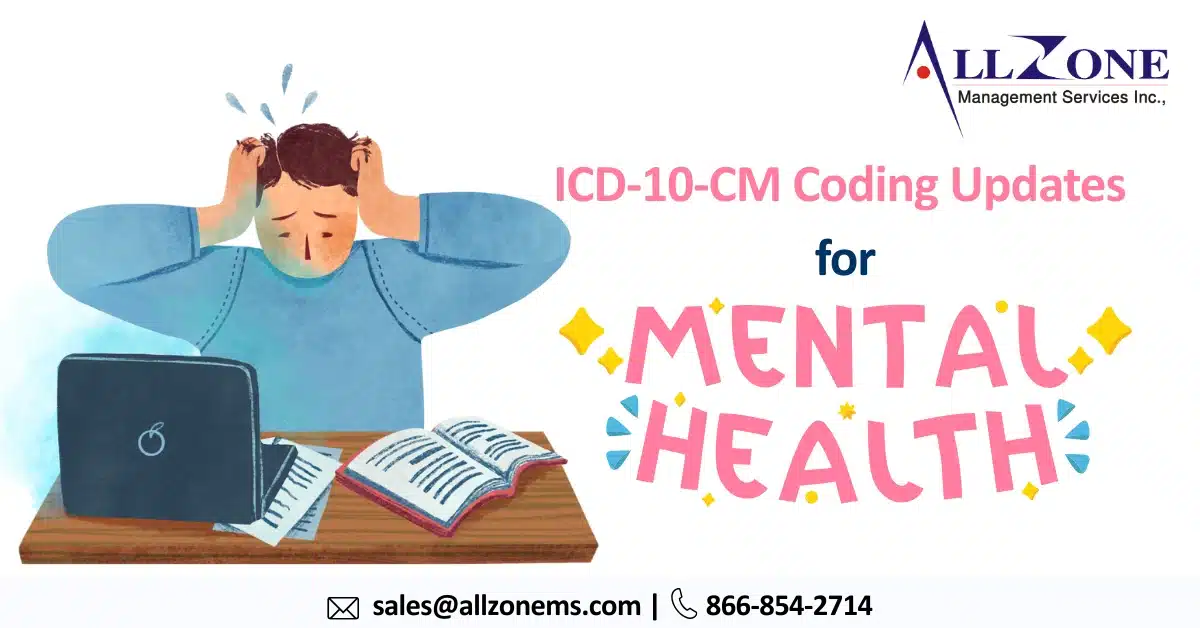The ICD-10-CM (International Classification of Diseases, Tenth Revision, and Clinical Modification) is a vital tool for accurately documenting and coding diagnoses in healthcare settings. As the field of mental health coding continues to evolve, it’s essential for clinicians and coders alike to stay updated on the latest guidelines and revisions.
The 2024 update to the ICD-10-CM includes several changes and additions relevant to mental health coding. These updates aim to improve specificity, accuracy, and clarity in diagnosing and documenting mental health conditions. Understanding these changes is crucial for ensuring proper reimbursement, clinical decision-making and epidemiological research.
In recognition of National Mental Health Awareness Month, here’s a two-part focus on mental health:
- Resources:
- This is a great time to explore the National Institute of Mental Health’s (NIMH) digital toolkit on mental health. It provides valuable information and resources.
- ICD-10-CM Coding Updates (February 2024):
Here’s a review of key updates for Chapter 5 (Mental, Behavioral, and Neurodevelopmental Disorders) relevant to the 2024 fiscal year:
- Pain Disorders:
-
- Use F45.41 for pain solely due to psychological factors.
- Use F45.42 for pain with psychological factors alongside a code from G89 (Pain, Not Elsewhere Classified).
-
- Mental/Behavioral Disorders due to Substance Abuse:
-
- “In remission” depends on the provider’s judgment and documented evidence.
- Assign only one code (dependence being the highest) when a provider documents use, abuse, and dependence of the same substance.
- Report “Psychoactive substance use, unspecified” only if it meets reportable diagnosis criteria. (Remember Medicare Code Edits for unspecified diagnoses.)
- Medical conditions due to substance use are not classified as substance-induced disorders. Use the Alphabetical Index for the medical condition code.
-
- Blood-Alcohol Level:
-
- Report Y90- only with a reportable diagnosis from F10 (Alcohol-related disorders).
-
- Factitious Disorders:
- This is when someone intentionally falsifies or induces their own symptoms. Consider T74 (confirmed abuse) or T76 (suspected abuse) alongside the appropriate mental health code.
- Dementia:
-
- Categories F01-F03 classify dementia based on severity and cause. Choose the code that aligns best with the provider’s documentation. If severity progresses, use the highest level code.
- For F01 and F02, additional codes might be needed to fully capture the patient’s condition.
-
- Pervasive Developmental Disorders (F84):
- Always code any related medical conditions and intellectual disabilities.
Remember, this is just a summary. Always refer to the official ICD-10-CM guidelines for complete details.
How Allzone Medical Coding Solution Transforms Healthcare Practices
Discover how Allzone medical coding solution optimizes accuracy and efficiency in healthcare practices. With our comprehensive system, you can seamlessly navigate the complexities of coding guidelines, ensuring precise documentation and compliance with the latest standards.
From pain disorders linked to psychological factors to nuanced conditions like dementia and factitious disorders, our solution provides clarity and guidance every step of the way. Stay ahead of the curve with our intuitive platform, designed to streamline coding processes and enhance patient care outcomes

